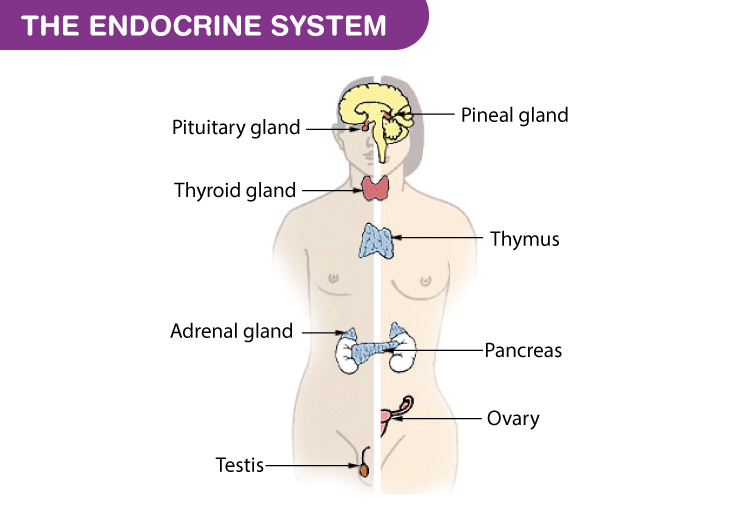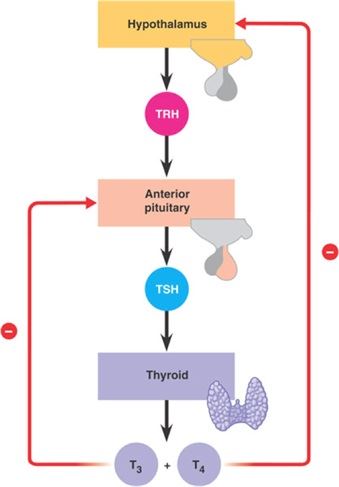Hormones Definition
“Hormones are chemicals synthesized and produced by the specialized glands to control and regulate the activity of certain cells and organs. These specialized glands are known as endocrine glands.”
Table of Contents
- Hormones
- Types
- Glands
- List
- Functions
- Diseases
- Chemical Messengers
- Feedback Mechanism
What are Hormones?
As stated above, hormones are chemicals that essentially function as messengers of the body. These chemicals are secreted by special glands known as the endocrine glands. These endocrine glands are distributed throughout the body. These messengers control many physiological functions as well as psychological health. They are also quite important in maintaining homeostasis in the body.
Explore more: Endocrine Glands And Hormones
Cell Signaling
The effects of hormones depend on how they are released. Hence, signalling effects can be classified into the following:
- Autocrine: The hormone act on the cell that secreted it.
- Paracrine: The hormone act on a nearby cell without having to enter the blood circulation.
- Intracrine: The hormone is produced in the cell and acts intracellularly means inside the cell.
- Endocrine: The hormone act on the target cells once it is released from the respective glands into the bloodstream.
Types of Hormones
To regulate various functions, different types of hormones are produced in the body. They are classified as follows:
- Peptide Hormones
- Steroid Hormones
Peptide Hormones
Peptide hormones are composed of amino acids and are soluble in water. Peptide hormones are unable to pass through the cell membrane as it contains a phospholipid bilayer that stops any fat-insoluble molecules from diffusing into the cell. Insulin is an important peptide hormone produced by the pancreas.
Steroid Hormones
Unlike peptide hormones, steroid hormones are fat-soluble and are able to pass through a cell membrane. Sex hormones such as testosterone, estrogen and progesterone are examples of steroid hormones.
Also Read: Placebo Effect
Endocrine Glands and the Hormones Secreted
As stated before, hormones are released by the endocrine glands. These are different from other glands of the human body as they are ductless.

- Hypothalamus: It controls the body temperature, regulates emotions, hunger, thirst, sleep, moods and allow the production of hormones.
- Pineal: Pineal is also known as the thalamus. It produces serotonin derivatives of melatonin, which affects sleep patterns.
- Parathyroid: This gland helps in controlling the amount of calcium present in the body.
- Thymus: It helps in the production of T-cells, functioning of the adaptive immune system and maturity of the thymus.
- Thyroid: It produces hormones that affect the heart rate and how calories are burnt.
- Adrenal: This gland produces the hormones that control the sex drive, cortisol and stress hormone.
- Pituitary: It is also termed as the “master control gland,”. This is because the pituitary gland helps in controlling other glands. Moreover, it develops the hormones that trigger growth and development.
- Pancreas: This gland is involved in the production of insulin hormones, which plays a crucial role in maintaining blood sugar levels.
- Testes: In men, the testes secrete the male sex hormone, testosterone. It also produces sperm.
- Ovaries: In the female reproductive system, the ovaries release estrogen, progesterone, testosterone and other female sex hormones.
All these glands work together to produce and manage the hormones of the body.
Also Read: Sex Hormones
List of Important Hormones
- Cortisol – It has been named as the “stress hormone” as it helps the body in responding to stress. This is done by increasing the heart rate, elevating blood sugar levels etc.
- Estrogen-This is the main sex hormone present in women which bring about puberty, prepares the uterus and body for pregnancy and even regulates the menstrual cycle. Estrogen level changes during menopause because of which women experience many uncomfortable symptoms.
- Melatonin – It primarily controls the circadian rhythm or sleep cycles.
- Progesterone – It is a female sex hormone also responsible for menstrual cycle, pregnancy and embryogenesis.
- Testosterone – This is the most important sex hormone synthesized in men, which cause puberty, muscle mass growth, and strengthen the bones and muscles, increase bone density and controls facial hair growth.
Also Read: Animal Hormones
Functions of Hormones
Following are some important functions of hormones:
- Food metabolism.
- Growth and development.
- Controlling thirst and hunger.
- Maintaining body temperature.
- Regulating mood and cognitive functions.
- Initiating and maintaining sexual development and reproduction.
Also Read: Plant Growth Regulators
Hormonal Diseases
Several hormonal diseases occur when there is a malfunctioning of the endocrine glands. Common hormonal issues are associated with hypothalamus, adrenal and pituitary glands. An increase or decrease in the secretion of these hormones can severely affect growth, metabolism and development.
Diseases such as hyperthyroidism, osteoporosis, and diabetes are caused due to hormonal imbalance. The factors responsible for hormonal diseases can be genetic, environmental, or related to diet.
Also Read: Mechanism of Hormone Action
Why are Hormones called Chemical Messengers?
The prominent role of hormones is that of a messenger. Hypothalamus is a part of forebrain where a numerous amount of neurosecretory cells are present. These neurosecretory cells are specialized in the secretion of a hormone called neurohormones. They stimulate the anterior lobe of the pituitary to produce various other hormones.
Sometimes, hormones act more than a regulator than a messenger. The changes in the level of hormone production lead to certain changes in the body. Thus, hormone as a regulator maintains the homeostasis of the body. Once the hormones meet their target, their production needs to be controlled and this is attained by a mechanism called feedback control mechanism. The feedback mechanism could either be positive or negative.
Feedback Mechanism – Thyroid

The thyroid gland produces a hormone called thyroxine, and its secretion is controlled by the Thyrotropin Releasing Hormone (TRH) from the hypothalamus and the Thyroid Stimulating Hormone (TSH) from the anterior pituitary.
When the level of thyroxine in the blood reduces, the hypothalamus stimulates the thyroxine secretion by stimulating TSH secretion. This represents a positive feedback mechanism.
If the hypothalamus continues to stimulate thyroxine production, it could result in a high level of thyroxine in the blood. This sends negative feedback to the hypothalamus to reduce or stop the TRH and TSH secretion which regulates the thyroxine level in the body. This is a negative feedback mechanism.
Hormones are meant for their target tissues for specific functions. As soon as they meet their target, they are removed. This is mainly done by the liver, kidney and other organs.
Frequently Asked Questions
1. What is a hormone? What does it do?
2. List the types of Hormones.
3. Name 3 diseases caused by hormonal imbalance.
- Diabetes.
- Osteoporosis.
- Hyperthyroidism.
